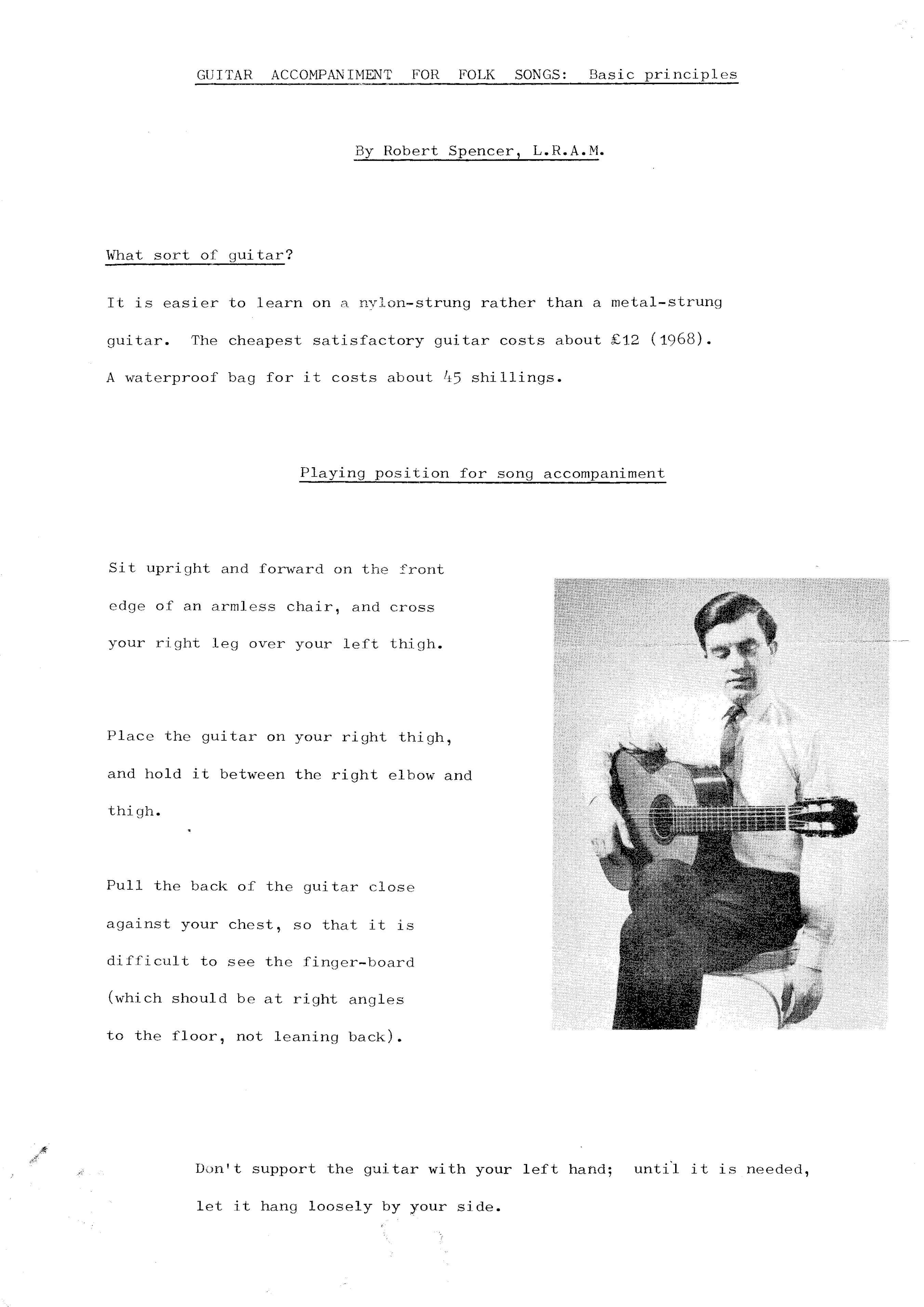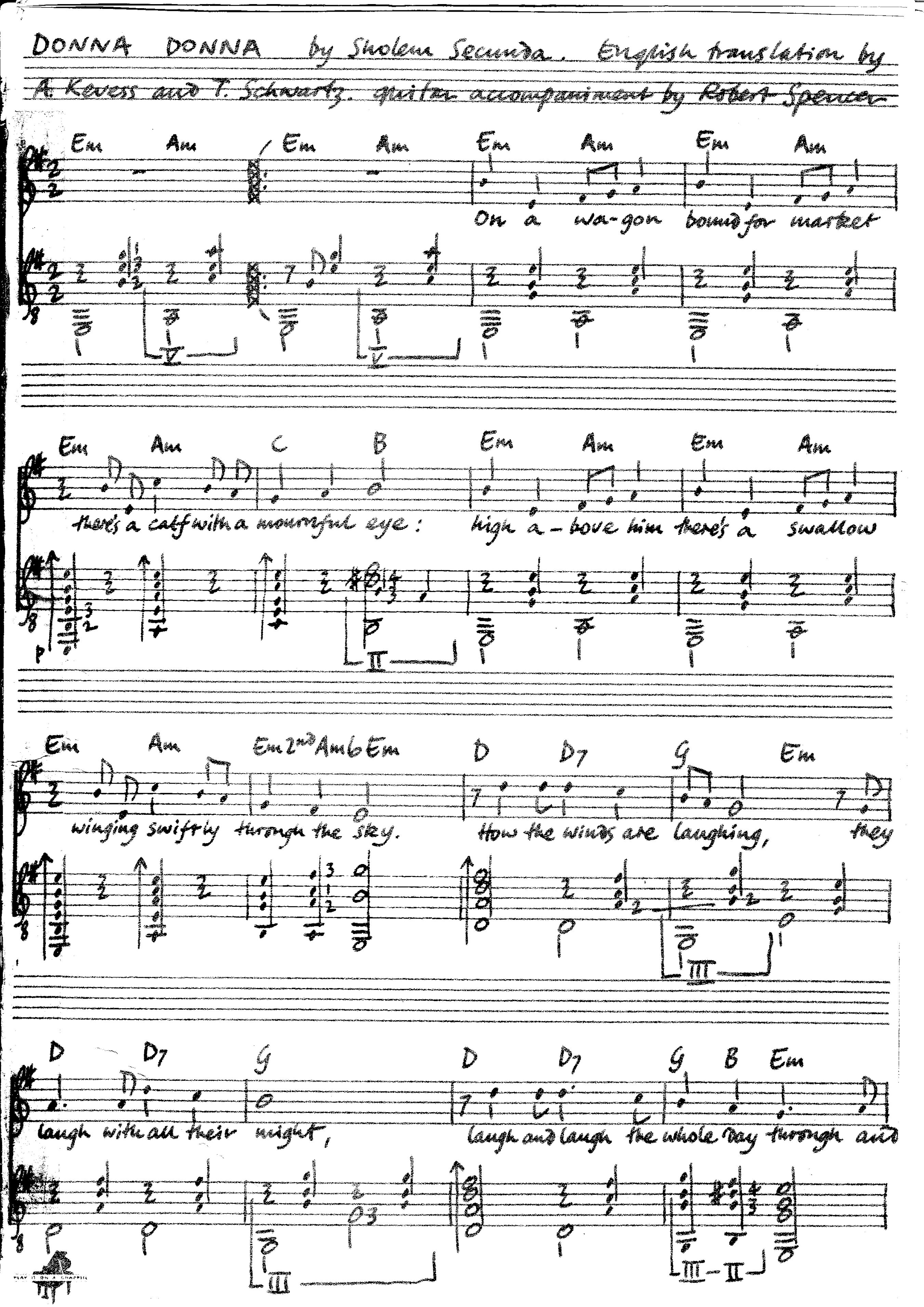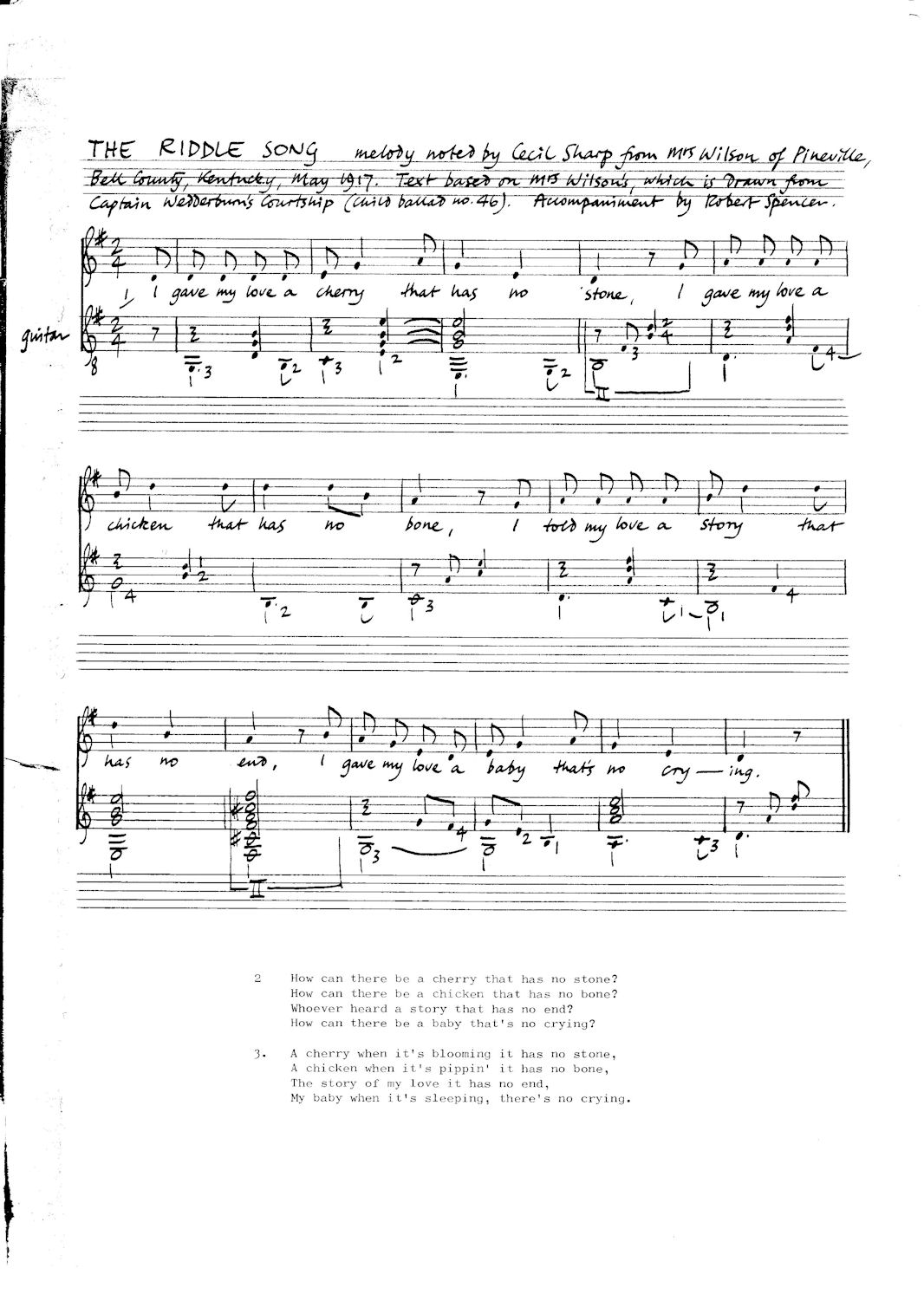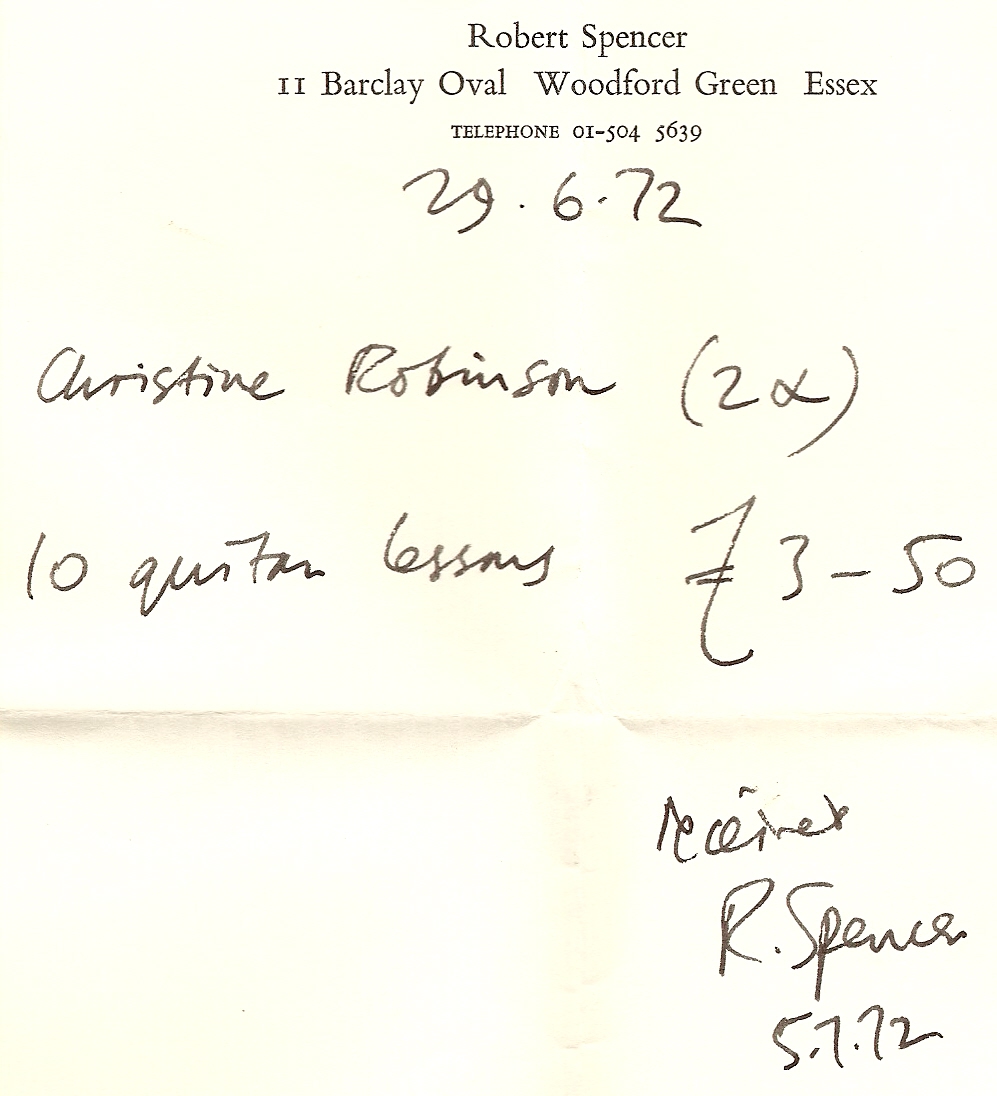
Loughton County High School for Girls
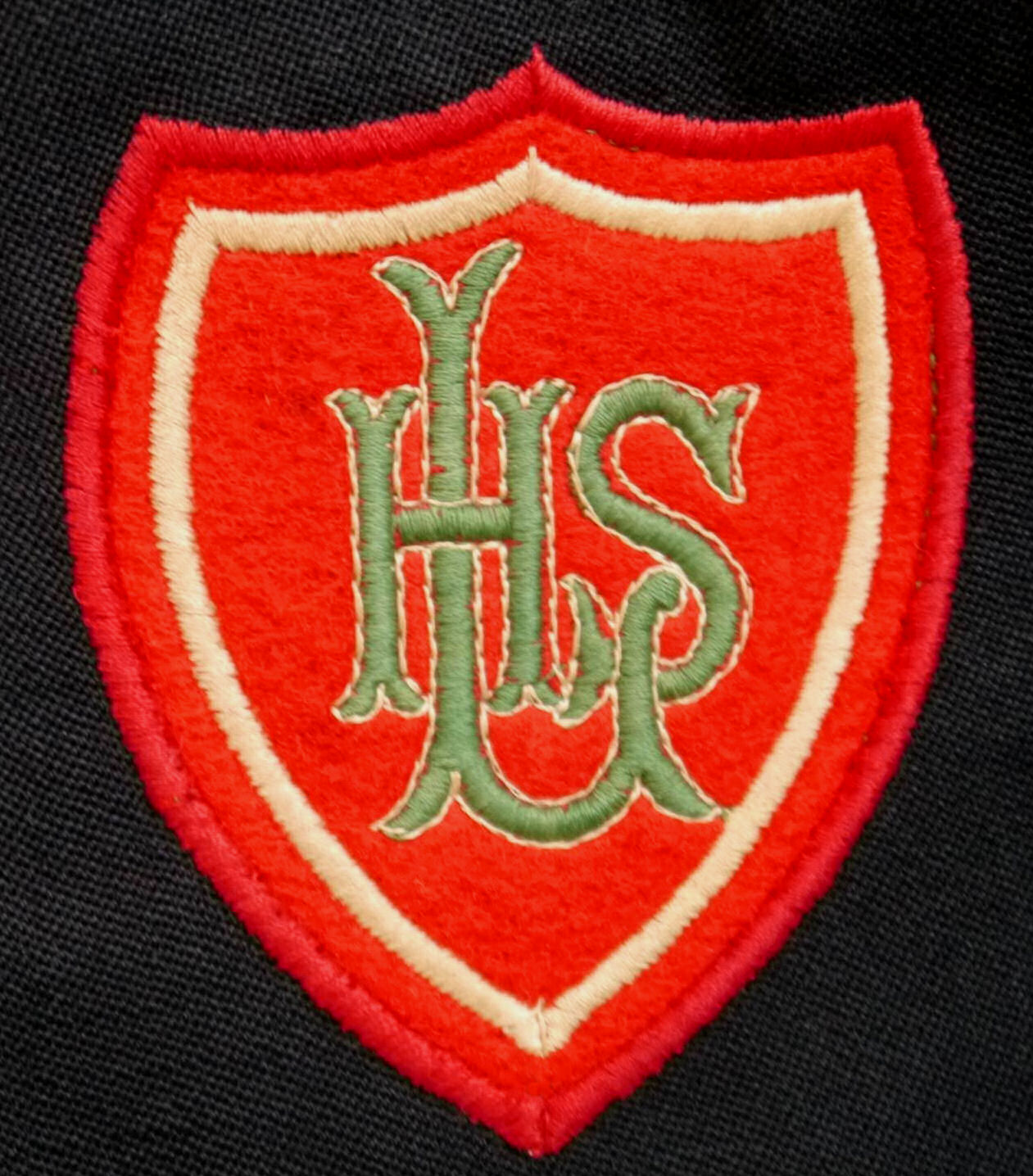
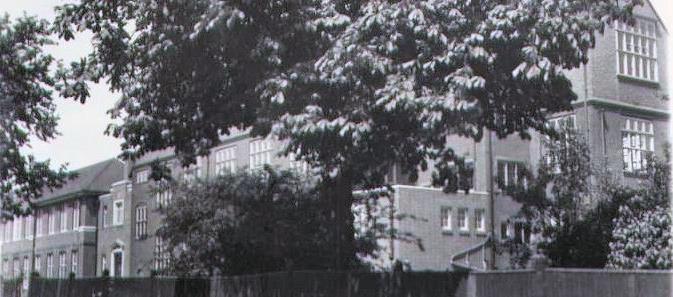


Copyright © 2014 by Susan Capes · All Rights reserved · E-Mail: sue@loughtonchs.co.uk
Robert Spencer was a leading figure in the early music field, equally accomplished as a singer, lutenist, guitarist, musicologist and teacher. This is the more remarkable since he only started his musical education at the age of 25, when he abandoned his job as a librarian.
Spencer's earliest memories were of his mother playing the piano, but even as a very small child he had been interested in singing, and as a schoolboy he was always an enthusiastic member of choral groups. When he was 17 his father gave him a guitar and, although he never had a lesson, he managed to make a recognisable sound.
In 1955 he went to a recital of poetry interspersed with lute solos by Julian Bream at the old L-shaped Purcell Room, in London, and was enchanted. That same year he attended the Haslemere Festival for the first time - cycling all the way from Woodford Green - and heard the German lutenist Walter Gerwig play in several of the programmes. At a party following one of the concerts he met Gerwig, who gave him some initial instruction. So, between Bream and Gerwig, Spencer was determined to learn to play the lute as well.
The next step was to attend the Dartington Summer School, where Bream was playing and teaching. Spencer managed a lesson or two with Bream but gained the most information by taking some 30 photographs of Bream's performance in detail. Armed with the results, he studied all the different hand positions and taught himself to play.
Since leaving school Spencer had worked at his local library and by the age of 25 had qualified as a chartered librarian. But he found he was clock-watching and thinking about music all the time. So he consulted Thurston Dart, then Professor of Music at Jesus College, Cambridge, as to how he could get a scholarship to have some musical training. He once explained to me: "It was a bit of a nerve to approach someone like Dart, but I knew a scholarship was the only option because I wasn't good enough for one of the colleges, and in any case had no money for board and lodging, even if they gave me tuition free." Dart recommended him for a scholarship to the Dartington Music School where he stayed for three years with tuition, board and lodging all found.
Before going to Dartington, Spencer had had some singing lessons with Fabian Smith and it was then that he became interested in 11th-century English song. At one of Smith's students' concerts he met the actress/ singer Jill Nott-Bower and they formed a musical partnership. It did not take these enterprising young people long to realise that their duo had professional potential. They knew that music clubs are invariably short of money and always on the lookout for some unusual presentation, especially if it does not involve a piano. So they devised recitals that included Elizabethan songs with lute, Purcell songs with theorbo, Italian songs with chitarrone and Spanish and English songs with guitar.
They gave their first full evening programme in 1958 and later expanded their programmes - often dressed in period costume - to include readings from Shakespeare and Pepys's Diary: a bewigged Spencer waving a quill pen in the air transported his audience right back to the 17th century. For almost 40 years they made a successful career of music-making in music clubs and schools in the UK, Europe, the United States and Japan. Spencer and Nott-Bower were married in 1960.
In addition to their duo recitals, Spencer's own career went from strength to strength. His first engagement was playing the lute for the Royal Shakespeare Company at Stratford-on-Avon and in 1961 he was a founder member of the Bream Consort. He accompanied the legendary counter-tenor Alfred Deller on many tours abroad and was a member of the Deller Consort from 1974 to 1979. More recently he toured Europe and Canada with James Bowman. He also once accompanied Dame Janet Baker for some songs with lute in a recording for EMI. From 1963, he performed regularly at the Haslemere Festival.
Spencer taught at the Royal Academy of Music in London for 23 years. He went there originally to teach lute and then took a class in English song. He later started a similar class at the Royal College of Music and taught at numerous conservatories and summer schools both in the UK and abroad. He was regarded as a most sensitive and perceptive teacher. "These are really classes in communication," he said, "as to how you get the message across to the audience. It's no use telling a student, `Do as I do.' Their interpretation has to stem from their own minds."
Apart from all his performing and teaching activities, Spencer's musicological researches are equally impressive and lack no respect from the pundits. He contributed numerous articles on a variety of subjects from rediscovered manuscripts to historical evidence gained from paintings. He also published several facsimiles and editions concerning the lute and guitar.
Bob Spencer was possessed of a warm and generous nature which endeared him to his many friends and students alike. He was always available to help with a query, often drawing instantly from the veritable mine of information lodged in his head. He was also incredibly optimistic. Even a few weeks ago, when he knew he was dying of cancer, he told me that he was happy because he had had a wonderful life in music, a wonderful family, wonderful friends - and no regrets.
Robert Allen Spencer, singer, lutenist, guitarist, musicologist and teacher: born Ilford, Essex 9 May 1932; married 1960 Jill Nott-Bower (two sons); died Woodford Green 8 August 1997.
Source: The Independent, Tuesday 12th August 1997
Spencer's earliest memories were of his mother playing the piano, but even as a very small child he had been interested in singing, and as a schoolboy he was always an enthusiastic member of choral groups. When he was 17 his father gave him a guitar and, although he never had a lesson, he managed to make a recognisable sound.
In 1955 he went to a recital of poetry interspersed with lute solos by Julian Bream at the old L-shaped Purcell Room, in London, and was enchanted. That same year he attended the Haslemere Festival for the first time - cycling all the way from Woodford Green - and heard the German lutenist Walter Gerwig play in several of the programmes. At a party following one of the concerts he met Gerwig, who gave him some initial instruction. So, between Bream and Gerwig, Spencer was determined to learn to play the lute as well.
The next step was to attend the Dartington Summer School, where Bream was playing and teaching. Spencer managed a lesson or two with Bream but gained the most information by taking some 30 photographs of Bream's performance in detail. Armed with the results, he studied all the different hand positions and taught himself to play.
Since leaving school Spencer had worked at his local library and by the age of 25 had qualified as a chartered librarian. But he found he was clock-watching and thinking about music all the time. So he consulted Thurston Dart, then Professor of Music at Jesus College, Cambridge, as to how he could get a scholarship to have some musical training. He once explained to me: "It was a bit of a nerve to approach someone like Dart, but I knew a scholarship was the only option because I wasn't good enough for one of the colleges, and in any case had no money for board and lodging, even if they gave me tuition free." Dart recommended him for a scholarship to the Dartington Music School where he stayed for three years with tuition, board and lodging all found.
Before going to Dartington, Spencer had had some singing lessons with Fabian Smith and it was then that he became interested in 11th-century English song. At one of Smith's students' concerts he met the actress/ singer Jill Nott-Bower and they formed a musical partnership. It did not take these enterprising young people long to realise that their duo had professional potential. They knew that music clubs are invariably short of money and always on the lookout for some unusual presentation, especially if it does not involve a piano. So they devised recitals that included Elizabethan songs with lute, Purcell songs with theorbo, Italian songs with chitarrone and Spanish and English songs with guitar.
They gave their first full evening programme in 1958 and later expanded their programmes - often dressed in period costume - to include readings from Shakespeare and Pepys's Diary: a bewigged Spencer waving a quill pen in the air transported his audience right back to the 17th century. For almost 40 years they made a successful career of music-making in music clubs and schools in the UK, Europe, the United States and Japan. Spencer and Nott-Bower were married in 1960.
In addition to their duo recitals, Spencer's own career went from strength to strength. His first engagement was playing the lute for the Royal Shakespeare Company at Stratford-on-Avon and in 1961 he was a founder member of the Bream Consort. He accompanied the legendary counter-tenor Alfred Deller on many tours abroad and was a member of the Deller Consort from 1974 to 1979. More recently he toured Europe and Canada with James Bowman. He also once accompanied Dame Janet Baker for some songs with lute in a recording for EMI. From 1963, he performed regularly at the Haslemere Festival.
Spencer taught at the Royal Academy of Music in London for 23 years. He went there originally to teach lute and then took a class in English song. He later started a similar class at the Royal College of Music and taught at numerous conservatories and summer schools both in the UK and abroad. He was regarded as a most sensitive and perceptive teacher. "These are really classes in communication," he said, "as to how you get the message across to the audience. It's no use telling a student, `Do as I do.' Their interpretation has to stem from their own minds."
Apart from all his performing and teaching activities, Spencer's musicological researches are equally impressive and lack no respect from the pundits. He contributed numerous articles on a variety of subjects from rediscovered manuscripts to historical evidence gained from paintings. He also published several facsimiles and editions concerning the lute and guitar.
Bob Spencer was possessed of a warm and generous nature which endeared him to his many friends and students alike. He was always available to help with a query, often drawing instantly from the veritable mine of information lodged in his head. He was also incredibly optimistic. Even a few weeks ago, when he knew he was dying of cancer, he told me that he was happy because he had had a wonderful life in music, a wonderful family, wonderful friends - and no regrets.
Robert Allen Spencer, singer, lutenist, guitarist, musicologist and teacher: born Ilford, Essex 9 May 1932; married 1960 Jill Nott-Bower (two sons); died Woodford Green 8 August 1997.
Source: The Independent, Tuesday 12th August 1997
Robert Spencer
At LHS we were very fortunate to have Robert Spencer as a visiting teacher of classical guitar. Many girls developed a crush on this kind, gentle (and handsome!) musician who tolerated our fumbling fingers and wobbly voices while teaching us the delights of such a versatile instrument. He was as happy to write an adaptation of current pop songs as he was to teach us established guitar solos and ensembles. Mary Hopkin and Simon and Garfunkel, amongst others, were subjected to his very clever writing. I (Sue) still use some of his handwritten sheet music (see below for a couple of examples) when I'm "twiddling" on my old guitar (the same one he sold me in 1966) and I was very sad to hear of his untimely death from cancer in 1997, at the age of 65.
His obituary published by The Independent newspaper, written by Margaret Campbell:
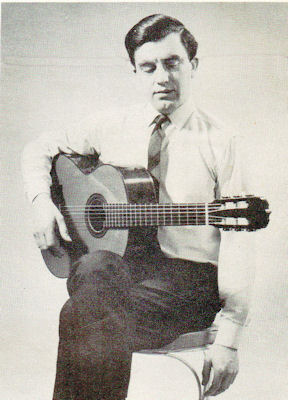
Click to enlarge
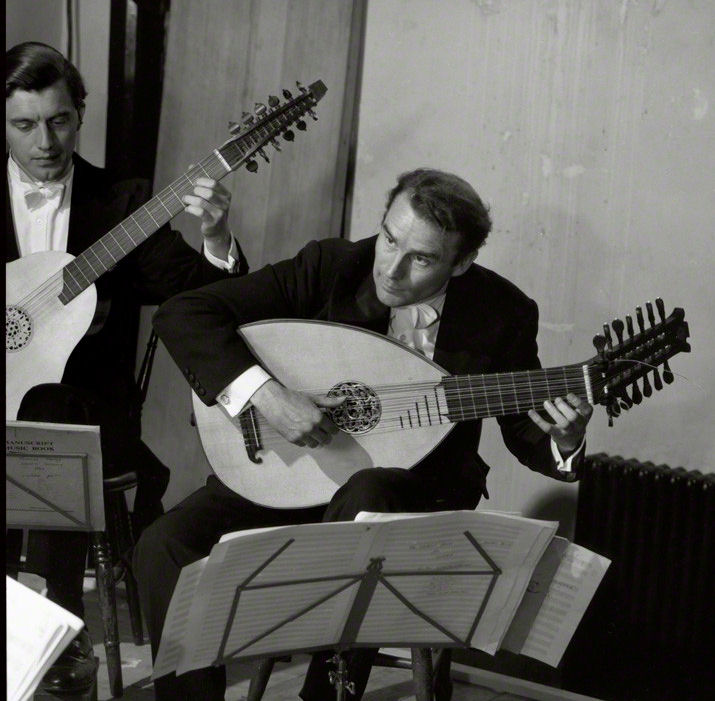
Robert Spencer and Julian Bream
from the National Portrait Gallery archives
from the National Portrait Gallery archives
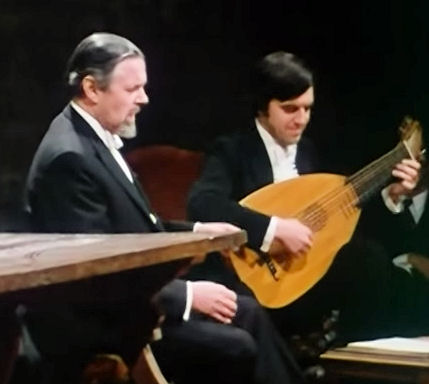
Accompanying counter-tenor Alfred Deller
amazed that Christine still had a receipt for lessons !
